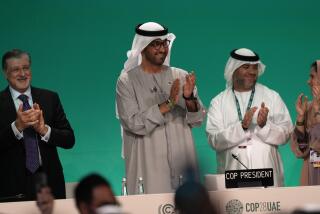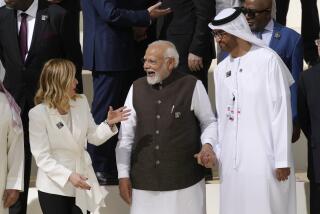Arab Leaders End Summit With Demand for Iraq’s Withdrawal
- Share via
DOHA, Qatar — Arab sheiks and emirs of the Persian Gulf concluded a summit Tuesday without any new breakthroughs on a peaceful resolution to the crisis in Kuwait but issued a last, uncompromising demand for Iraqi troops to withdraw or face “the perils of a devastating war.”
Clearly backing the United States in its effort to stare down Iraqi President Saddam Hussein in the countdown before the United Nations’ Jan. 15 deadline for withdrawal, the heads of the six-nation Gulf Cooperation Council reaffirmed their backing for previous international resolutions and left all remaining options for compromise in the hands of the Iraqi leader.
“The council repeats its demands that the Iraqi leadership should respect international charters and norms and the agreements it signed with the state of Kuwait, and resort to peace . . . and not to endanger the lives and waste the potentialities of Iraq’s people in a confrontation that would not realize anything other than loss and devastation,” the leaders of Saudi Arabia, Qatar, Bahrain, the United Arab Emirates, Kuwait and Oman said in their final communique.
During a four-day summit in the Qatari capital, their first since Iraq’s Aug. 2 invasion of Kuwait, the gulf leaders resolved to improve relations with non-Arab Iran, boost future regional defenses and strengthen their ties in order to avoid the mistakes of the past.
“We should recognize that the Arab system has failed to confront the disaster and has made little contribution to tackle the problem,” Saudi Arabia’s King Fahd said in an unusually frank statement issued near the conclusion of the summit. “We should revise the order of the gulf house so as to emerge from this crisis stronger.”
Part of the revised order will undoubtedly include improved relations with Iran--the very country whose threats from the other side of the Persian Gulf throughout the 1980s first led to the creation of the gulf alliance.
On the opening day of the summit, Qatar’s foreign minister, Mubarak ibn Ali al Khatar, announced that talks are under way to include Iran in any new security arrangements that are drafted for the gulf region. “We have historic ties with Iran . . . and it is entering in the security arrangement by right of its geographic significance,” he told reporters here.
The council’s final communique lauded efforts by other “brotherly and friendly countries” to try to achieve a peaceful settlement of the crisis but fell far short of reported attempts by some delegates, led by Oman, to dispatch an envoy to Baghdad in an attempt to determine what it would take to persuade the Iraqi leader to withdraw his forces.
Discussions became nearly quagmired at one point when Oman’s Sultan Kaboos ibn Said reportedly threatened to hold off any support for a military attack against Iraq unless peaceful options were explored further, summit sources said.
Other gulf leaders insisted on maintaining a united international front, and King Fahd issued one of his strongest statements since the beginning of the crisis, declaring that there is still room for a peaceful resolution but that the gulf is also prepared for war.
“We have not decided either a decision for war or peace, but we have taken a decision for the return of Kuwait, peacefully if possible or by war when war becomes inevitable,” the Saudi monarch said.
“We don’t want to close the doors of hope: Up to now, the person who we thought one day was our friend can avert (for) himself and his nation the horrors of war. When he chose confrontation, we have shown him that we are capable of confrontation. When he decides to choose concord, we are also capable of opting for concord. The decision of peace has proved to be more brave than the decision of war.”
Most analysts say the gulf leaders are probably powerless to shape the outcome of a crisis that has become balanced between Washington and Baghdad. Yet the Iraqi leader has made overtures to the gulf, dispatching his foreign minister, Tarik Aziz, for talks in Oman and, according to the Iraqi ambassador in Doha, submitting a proposal that the six GCC countries help develop an “Arabian” solution to the crisis centered on the gulf nations of the Arabian peninsula.
Moreover, the Gulf Cooperation Council nations stand to have leverage over both Iraq and Kuwait because it may be largely from their coffers that both countries are revitalized once the crisis is over, said John Duke Anthony of the National Council on U.S. Arab Relations, who attended the summit.
“They have all sorts of lines of communications out--probing, testing, evaluating what would be the appropriate mix for the region,” now and in the future, Anthony said. “These countries are Iraq’s neighbors. The U.S. isn’t. And, yes, they will have to find an arrangement to live as neighbors in the future.”
Conference sources said the GCC had strongly urged the United States to send a senior envoy to Baghdad before President Bush’s proposal to exchange visits between Secretary of State James A. Baker III and Iraqi Foreign Minister Aziz, an initiative that thus far has been blocked by a failure to agree on dates for the visits.
However, a Saudi newspaper editor said by the conclusion of this week’s summit: “The drums of war are beating. . . . In any case, it’s out of their hands. It’s between Washington and Baghdad.”
The gulf leaders discussed a range of options for increasing future defense cooperation in the region, with several gulf officials advocating a gulf-wide defense force of perhaps 50,000 troops as a deterrent to future aggression against the wealthy but largely weak oil emirates.
More to Read
Sign up for Essential California
The most important California stories and recommendations in your inbox every morning.
You may occasionally receive promotional content from the Los Angeles Times.













